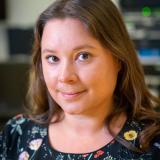Attention, Memory and Consciousness
Understanding attention, memory, and consciousness is crucial for understanding how we process, remember, and experience the world around us. In our group, we use behavioral and neuroimaging techniques to study these processes.
-

dr. Myrthe Faber
Principal Investigator
One particular focus of the group is on spontaneous cognition, and more specifically, on mind wandering. When, why, and how does the mind wander? We are interested in the cognitive and neural underpinnings of mind wandering, in particular in the context of discourse processing. Our research focuses on where mind wandering thoughts come from, and how brain networks interact to generate these spontaneous thoughts. We combine behavioural and neuroimaging research with the development of state-of-the-art analysis methods to measure mind wandering from behavioral (e.g., eye gaze) and brain data.
Specifically, we are interested in uncovering the role of mind wandering in our everyday experience: is it merely an unwelcome distraction, or does it (positively) contribute to tasks that might rely on internally-directed attention, such as feeling absorbed in a story, or coming up with creative ideas. To do so, our team collaborates with researchers in Psychology, Culture Studies, Communication Sciences, and Philosophy.
In addition, we have a strong interest in semantic and episodic memory, with a focus on how the architecture of the brain supports (spontaneous) retrieval and consolidation of knowledge and experiences. We therefore study how the brain processes and stores events (collaborations with Dr. G.A. Radvansky, University of Notre Dame, Dr. Neil Cohn, Tilburg University), and the functional neuroanatomy of language and memory areas in the brain (collaboration with the Donders Institute).
Projects
- Drawn in or zoned out? Tracking the wandering mind during reading (PI: Dr. Myrthe Faber, funded by NWO Veni grant)
- Investigating mind wandering while driving with a continuous virtual-reality driving task (Dr. Myrthe Faber together with Dr. Andrew Reid, funded by Digital Scienes for Society)
- Why not all those who wander are lost: Exploring the effect of individual differences in mental imagery on perceptual decoupling during mind wandering (Dr. Myrthe Faber together with Dr. Tessa van Leeuwen, funded by Tilburg School of Humanities and Digital Sciences)
- The effect of mind wandering on creativity: how does mind wandering “unstuck” your thinking? (Dr. Myrthe Faber together with Dr. Alwin de Rooij)
- Thinking about sensations: how sensory language cues spontaneous thoughts (Rosie Mai, PhD project under supervision of Dr. Myrthe Faber, Dr. Silvy Collin and Dr. Marie Postma).
- The role of schema in encoding and retrieving episodic memories (Dr. Silvy Collin in collaboration with Ken Norman, Princeton University)
- Ingredients of a narrative: How an abstract feature space and event position contribute to a situation model (Dr. Silvy Collin in collaboration with Rene Terporten at RU, Roel Willems at RU, Monique Flecken at UvA, and Roshan Cools at RU, funded by the NWO Language in Interaction consortium)
- Correcting schema-related memories in our minds (Dr. Silvy Collin)
